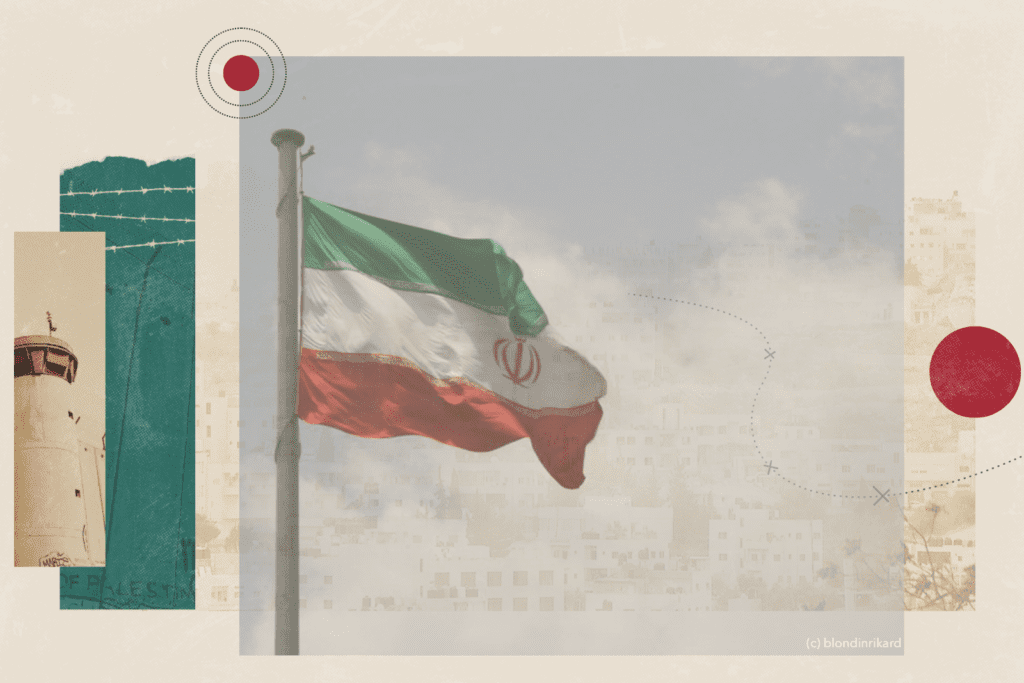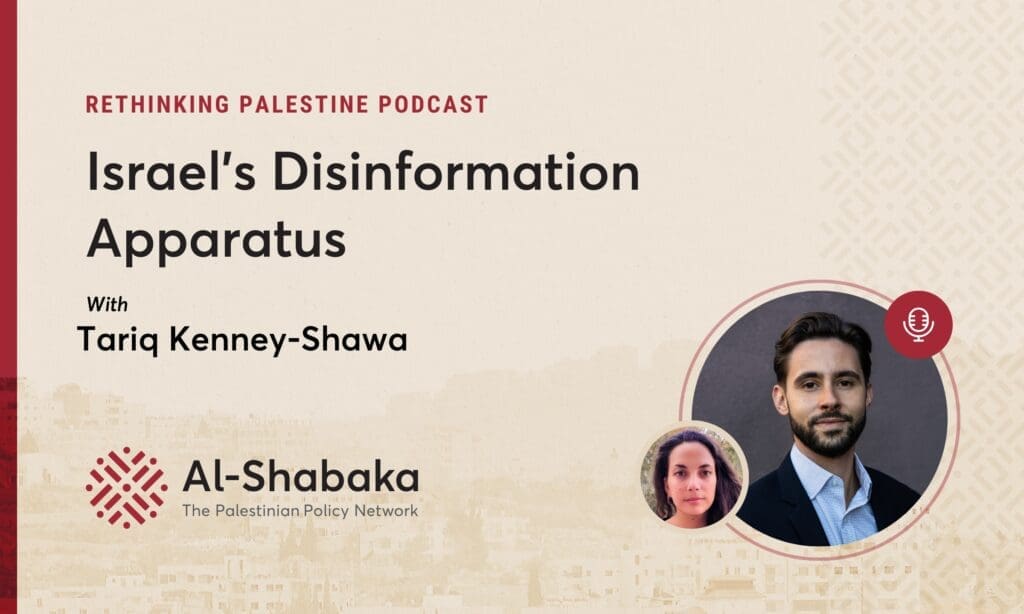- Topics
-
Topics
See our analysis on civil society and how it shapes culture, politics, and policies
Read our insights on the shifting political landscape and what it means for Palestine
Learn more about the policies and practices shaping the Palestinian economy
Strengthen your understanding of the unique conditions for Palestinian refugees across the Middle East
-
- Analysis
-
Analysis
In-depth analysis on existing or potential policies that impact possibilities for Palestinian liberation.
Insights and perspectives on social, political, and economic questions related to Palestine and Palestinians globally.
Concise analysis into a specific policy, its background and implications.
Commentary that brings together insights from multiple analysts.
Compilations of past Al-Shabaka works surrounding a specific theme.
Longer-form, ad hoc projects that seek to confront research questions outside the scope of our regular analysis.
A policy-driven research initiative by Al-Shabaka: The Palestinian Policy Network.
Our monthly webinar series that brings together Palestinian experts.
Featured
While it remains unclear how and when Israel will respond to Iran’s operation, geopolitics have undoubtedly already shifted. In this roundtable, Al-Shabaka analysts Fadi Quran, Fathi Nimer, Tariq Kenney-Shawa, and Yara Hawari offer insights on the regional impact of Iran’s recent maneuver and situate the ongoing genocide in Gaza within this broader context.


 +Mainstream media coverage of the genocide in Gaza throughout the West has highlighted not only deep biases in favor of the Israeli regime, but also the ease in which Palestinians are dehumanized. In this commentary, Yara Hawari details Israel’s strategy to strip Palestinians of their humanity in the public realm, as well as the role of Western media in advancing Israel’s aims. She reveals consistent patterns of journalistic malpractice since October 7, 2023, and concludes that the Western outlets are inescapably complicit in the Israeli regime’s genocide against the Palestinian people of Gaza.
+Mainstream media coverage of the genocide in Gaza throughout the West has highlighted not only deep biases in favor of the Israeli regime, but also the ease in which Palestinians are dehumanized. In this commentary, Yara Hawari details Israel’s strategy to strip Palestinians of their humanity in the public realm, as well as the role of Western media in advancing Israel’s aims. She reveals consistent patterns of journalistic malpractice since October 7, 2023, and concludes that the Western outlets are inescapably complicit in the Israeli regime’s genocide against the Palestinian people of Gaza. Yara Hawari· Apr 3, 2024Tariq Kenney-Shawa, Al-Shabaka’s US policy fellow, joins host Yara Hawari to discuss Israel’s information warfare tactics, used to influence public perception of its ongoing genocide in Gaza.
Yara Hawari· Apr 3, 2024Tariq Kenney-Shawa, Al-Shabaka’s US policy fellow, joins host Yara Hawari to discuss Israel’s information warfare tactics, used to influence public perception of its ongoing genocide in Gaza.
-
- Resources
- Media & Outreach
- The Network





Bartering Palestine for Research
“By now, 30 researchers have given me voice. My voice has been given in English, Dutch, French, Swedish, Arabic, and Spanish. But I’ve never heard it back, and I don’t think I ever will,” said Rabie, a 27-year-old grocer in Shatila Refugee Camp.1
Promising to give voice to the voiceless and change perceptions about marginalized communities are common tools used by researchers across the globe to gain access to interviewees and encourage participation in their research projects. Shatila Refugee Camp in Beirut, Lebanon is no different. Rabie is one of many Palestinians living there who is frequently bombarded by outsiders wishing to study him and every tragedy that happens to his community.
But the question at hand is not just how researchers and other information seekers gain access, it is the much larger issue of research saturation, or over-research. A simple keyword search in the Institute of Palestine Studies Library database in Beirut turns up 240 academic articles and 128 books and academic manuscripts written on Shatila, in addition to thousands of newspaper articles, reports, and films. The same search, however, retrieves only 17 academic articles on Burj al-Barajneh, another Palestinian refugee camp only 15 minutes away.
Despite the negative consequences that such an intensive outside focus has had on Shatila, and other over-researched communities around the world, social scientists have so far failed to prioritize the problem as a crucial and urgent research concern. I did not go to Shatila Refugee Camp to study the phenomenon and impact of over-research; I went to conduct interviews with a group of residents and community leaders in Shatila about political organizing for Palestinian civil rights in Lebanon. So what started as a research project to advocate for Palestinian civil rights, ended with a paper on research tourism.
In the course of this study, Shatila residents raised a number of ethical issues, including the methods by which researchers obtain data and information, the wide gulf between what the researched community needs and the objectives of the researcher and his/her funders, and the impact of research on the social dynamics of the camp.
Bartering For the Palestinian Cause
Since its creation in 1949 as a refuge for Palestinians fleeing Zionist forces, Shatila has been subjected to repeated wars and attacks that have twice led to its destruction and subsequent reconstruction. In 1982, the Israeli siege of Beirut led to the destruction of Shatila and massacre of over 3,000 of its residents in a 48-hour period. Shatila was destroyed for a second time during Lebanon’s War of the Camps from 1986 to 1990 and then rebuilt. In the following years it has served as a shelter for individuals and families fleeing conflict in neighboring areas, most recently in Syria. For these reasons, the camp is over-studied and often suffers from an uninformed research agenda that is imposed from above.
Although the relationship between researchers and their subjects is consensual, some of those wishing to obtain information from Shatila residents have been known to make promises linked to an improvement in their community’s situation. This is used as a way to coax their subjects into participating in a research activity, as they are aware that, for Shatila residents, research is seen to be valuable to the extent that it is connected to tangible social change. However, for social change to occur, research has to be connected to a broader social movement and political struggle, which is not usually the case. Consequently, the promises that researchers make often go unfulfilled.
Nevertheless, researchers do not shy away from offering to help their subjects in order to get access to information. According to the Shatila residents that were interviewed for this commentary, it is common for researchers to promise to “give [them] voice,” “change perceptions about the refugees,” and, especially when research is conducted about Al-Nakba, the forced displacement of some 750,000 Palestinians from their homeland upon the creation of Israel in 1948, “help the Palestinian cause.” Thus, their Palestinian subjects are led to believe that their involvement will result in better conditions for their community. The recurrent invocation of Palestine, however, has particularly tired the refugees who now mostly believe that it is a ploy to get them to participate:
“The last researcher who approached me wanted me to leave my shop and work with him all day. When I asked why, he said that it is for the Palestinian cause. I refused. I’ve had enough bartering for the Palestinian cause,” said Osama, a 27-year-old Shatila resident who runs a calling center in the camp.
Not all Shatila residents are as suspicious or experienced as Osama. Researchers approach children, too, many of whom are a lot more trusting and more easily persuaded by the money and special attention that participation sometimes affords. As a result, these children are inadvertently elevated above others in the community, essentially making heroes of them. Osama and other Shatila residents described this process as a cycle that often seems to end badly:
“Researchers support these children and give them money [during the research process]. But then, like canned food, there comes a time when these heroes expire, and they are left again to the alleys of the camp. People in the camp pity these children. They develop complexes. If this is not exploitation, what is it then?” he asked.
Research at Any Cost
The various actors involved in a research project – funders, researchers, local partner organizations, local facilitators (fixer, fellow academic, translator, transcriber), and the subject(s) of the research – all have different, sometimes overlapping, agendas and stated aims. While these actors depend on one another to fulfill the requirements of the research relationship, there is an unsaid hierarchy that puts the funding institution’s objectives on top and the subject’s objectives and/or needs at the bottom.
Consequently, instead of being treated as respected partners, Shatila residents are perceived as passive subjects who do not know what’s best for them or their community. This is especially symptomatic of the unequal terms through which academics and institutions in particular engage with their subjects. A number of residents reported that they have no say in what is being studied; these decisions are made outside the camps without consulting the community that will be affected most. This makes residents feel alienated from the topics that researchers select and frustrated that the needs of their community are often ignored.
In one example, a doctoral candidate from an Ivy League university in the United States went to Shatila hoping to do research on HIV. The researcher soon discovered, however, that it was an impossible task: There were no cases of HIV, and the youth being interviewed for the study were not comfortable speaking about issues related to sexual transmission of the disease. So the student left and returned one month later to research women on menopause. A local NGO that partnered with the researcher gathered women who fit the description, and they too thought that the topic was irrelevant. Nevertheless, as beneficiaries of the NGO the women were obligated to participate in the research anyway.
This anecdote, while certainly not indicative of all research projects in Shatila camp, raises many questions as to the decision-making process that accompanies them. In instances like these, there is an increased chance that the process and/or results will contribute to a false representation of the community. As doctoral candidate in political science at George Washington University Scott Weiner writes, “Our stories must amplify, rather than overpower the narratives that are so important to the identity of those on whose assistance we depend.”
Research projects can also sometimes be determined by the popularity of a topic in mainstream media or a trend occurring in a particular field of research, both of which can be at the expense of other, more important, research endeavors. For a long period, researchers and organizations were interested in Al-Nakba. Shatila residents reported that, as refugees, they felt that research projects had reduced them to witnesses of Al-Nakba and that they were only useful as bearers of a Palestinian identity. Then, towards the end of 1999, there was a shift from Al-Nakba to topics about the refugees themselves:
“There is a trend now to focus on Palestinians, not as political subjects from Palestine, but as refugees, as human beings. I’m not against this, but I suspect that there is an ulterior motive to sway attention away from our political problems to the personal and the individual. This is the danger,” said Mahmoud, a human rights activist working with the UN agency for Palestinian refugees, UNRWA.
Other trends have included a focus on the Shatila Massacre and the War of the Camps. In most cases, it has been the tragedies and traumas of the people of the camp that have made them so sexy for researchers. Consequently, camp residents – the “victims” – are always reminded of their miserable situation in which they have no agency.
Exploiting the Exploiters
Camp residents are not simply victims of the practices and interests of outside researchers. The excessive attention paid to them by outsiders has distorted the power dynamics inside the camp, prompting camp residents, who act as fixers, transcribers, or translators, and local NGOs to find ways to benefit from their scholarly guests.
Camp facilitators or “gatekeepers,” for example, see the exercise as an opportunity to generate income for themselves. Yet, at the same time, they have been known to take researchers to the same families and even to tell the families what to say depending on what s/he thinks the researcher wants to hear. This not only threatens the integrity of the research conducted with their help, it also creates a perceived alliance between those individuals whose interests meet with the researchers: Camp residents call them parasites.
Residents voiced similar concerns over the role of their local NGOs, whose interests also sometimes align with foreign research agendas. In return for publicity and funding, these NGOs help researchers meet their objectives. According to some residents in the camp, these objectives often seem to highlight the negative aspects of their lives as refugees – a fact that the residents think of as an affront to their sense of dignity, a false representation of camp life, and damaging to the Palestinian cause.
“Why don’t people write about the talents in the camps?” asked Khalil, a young man with a degree in Business from Beirut Arab University. “If they keep talking about the problems, the West will say that we are incapable of taking care of ourselves and conclude that we should not have our own country. I think they harm the cause; they do not help us.”
A More Balanced Approach
Several arguments may be made from the preceding discussion of over-research in Shatila Refugee Camp for social science research practice more generally. Although over-research is particularly problematic within certain communities and locations, the solution to community complaints of over-research should not be seen as being solely about moving on to find other, less researched communities and locations.
Moreover, concerns about over-research should not just be approached as presenting a challenge or obstacle that researchers can attempt to overcome by embracing alternative research practices, questions, or methodologies. Interested parties should recognize that sometimes conducting no new research at all is the most appropriate response to community concerns of over-research.
Finally, the problem of over-research should not be seen as simply a problem of research methods or research ethics, internal to the field of social science research practice. It also pertains to the relationship of social scientific research and researchers to the wider society and economy as a whole. Only by positioning the actors involved within local, national, regional, and global structures of power, identity, and interests can the problems of over-research begin to be understood and addressed.2
Mayssun Succarie
Latest Analysis
Palestinian Perspectives on Escalating Iran-Israel Relations
The Gaza Genocide in Western Media: Culprits of Complicity
Israel’s Disinformation Apparatus: A Key Weapon in its Arsenal
We’re building a network for liberation.
As the only global Palestinian think tank, we’re working hard to respond to rapid developments affecting Palestinians, while remaining committed to shedding light on issues that may otherwise be overlooked.